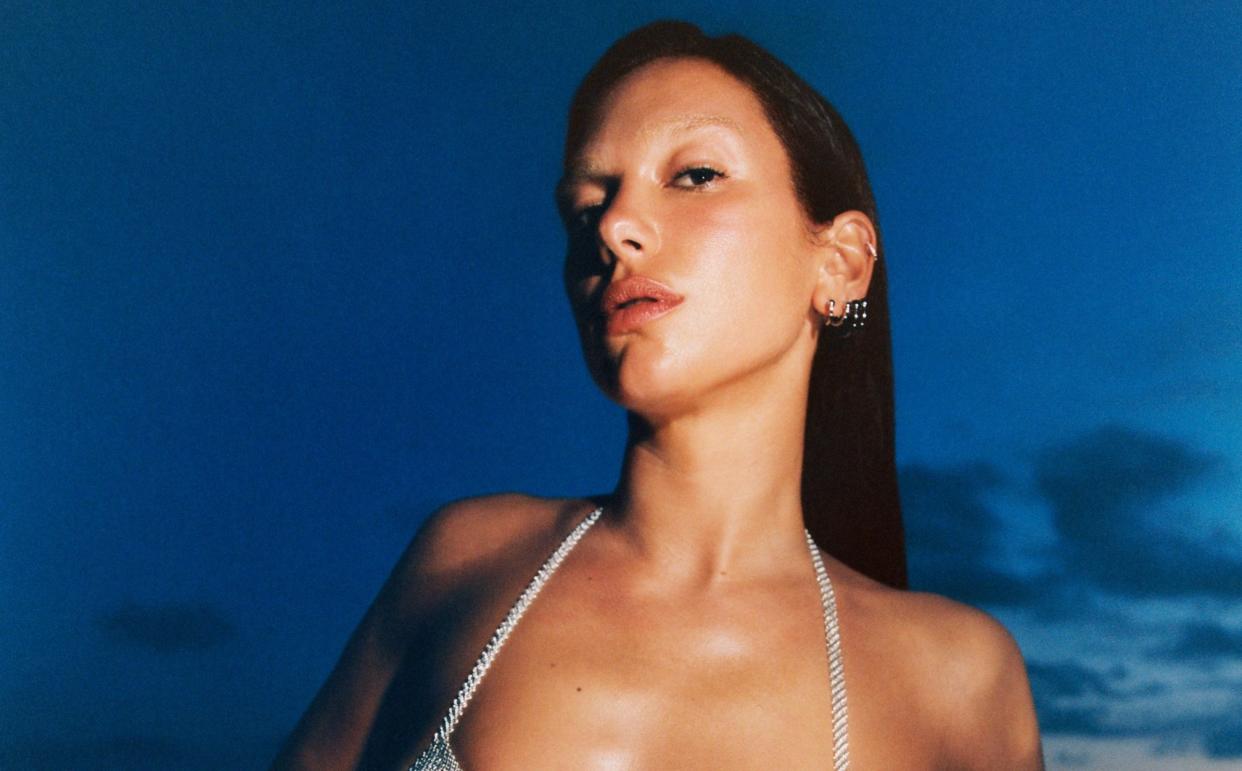Dua Lipa comes close to pop perfect – plus the week’s best albums

Dua Lipa, Radical Optimism ★★★★☆
There is a shark circling Dua Lipa on the cover of her third album, Radical Optimism. I don’t know if this is intended as a metaphor for how the 28-year-old Albanian British pop star feels as a famous woman in the modern world but honestly, in a straight fight, I would fear for the shark.
It is rare to see a pop career proceed with such single-minded purposefulness. From being tipped for stardom on the BBC’s Sound of 2016 poll to headlining Glastonbury this year, Lipa is effectively the only young British musician of this past decade to have achieved genuine global superstardom. The UK music business has really struggled to compete in a streaming era dominated by blockbuster brands and high-powered social media marketing. Yet with each new release, Dua Lipa seems to be honing her own ideal of 21st-century pop perfection: all propulsive beats, gleaming vocals, shimmering sonics, soundbite lyrics, fashion photoshoot imagery and athletic choreography.
Whilst rivals churn out bloated playlists overcrowded with gimmickry and collaborations, the 11 tracks of Radical Optimism conjure an even more tightly focused set of supremely crafted and stylishly invigorating dance pop bangers than 2020’s world conquering Future Nostalgia. From the smoothly propulsive Miami sunshine groove of End of An Era to anthemic Happy For You, it rarely lets up. Even a teasing pause for a piano ballad, Anything For Love, quickly transforms into a jolly dance romp.
Each of these sharply honed songs offers an interesting perspective on the ups and downs of dating, in which (reflecting the album title), Lipa digs for positives in the negatives, lending it all the air of an uplifting, self-improvement dance class. Following the inescapable success of last year’s Barbie theme tune, Dance the Night, she could soundtrack an entire sequel with Radical Optimism.
Interestingly, at a time when the de facto method of pop production involves huge arrays of writers, producers and other singers and rappers, Lipa has tightened her circle of collaborators. Chief amongst them is songwriter-producer Kevin Parker (better known as Tame Impala, whose own journey has taken him from indie guitar rock to electronic psychedelia). His lush synths, dreamy harmonies and vocal echoes are much in evidence, albeit Lipa has mainstreamed his eccentric edges. The swirly miasma of synth sounds might pass for psychedelia in a pop club, but there’s nothing here to scramble brains at a rave.
Discussing influences, the star recently hailed the Britpop era psychedelia of Primal Scream and Massive Attack, but I doubt those artists would recognise themselves in such sleekly modern grooves. ABBA, however, might be pleased to hear the giddy piano glissandos bursting through Illusion and These Walls. There is an appealing sense of analogue virtuosity about the instrumentation, featuring a highly nimble bass and even a spot of jazz guitar noodling breaking out amidst the 90’s RnB shuffle of French Exit.
Lipa’s cooly commanding voice holds the attention on expansive melodies that make the most of her range, flowing between rich low tones, a husky middle and sweet highs. It is precise, luxurious, energetic without ever really breaking a sweat. Dua Lipa miraculously maintains the air of someone who never puts a hair or dance step out of place, which we all know is much harder work than it looks. There’s nothing for sharks to feed on here. Neil McCormick
Rachel Chinouriri, What a Devastating Turn of Events ★★★★☆
Plenty of artists have been launched to brief stardom by TikTok but most haven’t stuck the landing. Not so for Rachel Chinouriri, whose song So My Darling was picked up on the app in 2021 and made her popular with Gen Z listeners. The 25-year-old has already racked up millions of streams on Spotify, and her music has caught the attention of actress Florence Pugh, who features in the video for her new track Never Need Me.
In her long-awaited debut album, this Croydon-born artist shows the true scope of her musical influences. Raised by parents who had come to Britain from Zimbabwe, Chinouriri has cited African choral group Ladysmith Black Mambazo as one of her major inspirations – alongside Coldplay, Lily Allen and the indie folk trio Daughter.
It’s her range that lends Chinouriri success in this latest release. The singer has said that the album is a six years’ long attempt to “understand the things that caused me so much trauma”. Upbeat pop in breakup anthem Never Need Me offsets rocky tones in The Hills, when Chinouriri sings of feeling “broken” and “devastated”. Some lyrics are penned with her younger audience in mind – there’s talk of “risky texts” and Instagram DMs – but the themes she takes on, of love and loss, are universal.
It’s in It Is What It Is, a rhythmic noughties-style track, that Chinouriri really hits her groove. Lily Allen’s influence is clearer here than anywhere, and the singer has a new confidence that brings the first tracks in the album together.
The release is split in half: Chinouriri has said that she wanted to give listeners a “false sense of security”. All changes after the title song, What A Devastating Turn Of Events, which recalls the true story of a young woman who died by suicide after finding out she was pregnant. The song is moving and hits hard, but feels detached from the earlier, upbeat tracks. This back half of the album recalls Chinouriri’s softer, less self-assured releases.
Chinouriri has proved now that she is no TikTok one-trick pony – but doesn’t yet show her real identity as an artist. Lauren Shirreff
The Lemon Twigs

 Yahoo News
Yahoo News 
